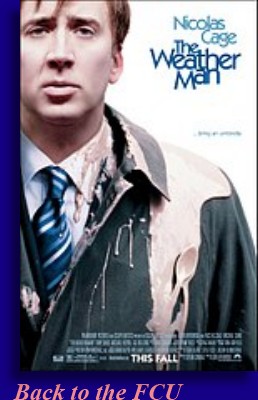

Reviewed by
Bud Carlson

When
you are dealing with a movie from a certain genre, that movie becomes
all about the language that has been established within that genre
previously. Each movie within that genre is based on a similar set of
terms, and is expected to be some derivation of those terms. And how
that language is manipulated, and how those expectations are played,
ultimately determines the success or failure of the movie.
The Weather Man sets those expectations aside, and approaches comedy and drama from a different direction. It is a movie that is not really built on a genre, formula, or plot. Instead, it is built on the accumulation of details and emotions that become the structure of the story. With Weather Man,
there isn’t a formula that is followed. Rather, the movie looks
at its character’s life and personal experiences, and it tells a
story based on how the little bumps in the road become emotional and
dramatic, and the structure of the movie falls out of that. This type
of movie is heavily reliant on the deftness of the screenplay, and the
credibility of the actor playing the lead role.
In The Weather Man, Nicolas Cage stars as Dave Spritz, a local TV weatherman who is struggling to figure out his life. When he’s on TV, he’s confident and polished; but in his daily life, he’s a disaster. He has been living his life seemingly on auto-pilot for the last 20-or-so years, with self-centered and hedonistic motives determining his actions. However, at the point in his life that is covered by the movie, he seems to have awakened from that auto-pilot mode, and when he looks at his life around him, he doesn’t like what he sees. (The nature and cause of his epiphany isn’t really discussed in the movie, but I just assumed it was a mid-life crisis type of thing). He wants badly to fix all that is wrong with his life, and spends most of the movie living


right
on the edge between emotional stability and really dropping off into a
serious emotional mess. He’s divorced from his wife Noreen (Hope
Davis), but he doesn’t seem able to process what happened between
them. Both of his kids are troubled, but in very different ways. His
son Mike (Nicholas Hoult) got busted with pot and is going through rehab, while his daughter Shelly (Gemmenne
de la Pena) has a terrible weight problem and seems miserable.
Dave’s father is a famous, internationally acclaimed novelist
(Michael Caine), who is disaffected and
unemotional toward his son. Dave does not feel any emotional
fulfillment from his career as a weather man, and it seems as though
his father’s success casts a long shadow over Dave’s sense
of himself. In short, the cards are really stacked against Dave being
able to pull it all together.
And that’s about it. There’s no gimmick, no high-concept twist. It’s just a film about this guy dealing with all
of these pressures and edging closer and closer to a possible breaking
point. Cage is an actor who I find occasionally frustrating, not
because of a lack of talent, but because he seems to take roles that
set him up to underachieve (Gone in 60 Seconds springs to mind here). But in Weather Man,
he’s got a strongly-written character to play and no easy quirks
to fall back on. He does a wonderful job of letting us into
Dave’s mind.
There
are a number of big laughs in the film, but it’s not a comedy.
There’s an undercurrent of real pain that underlies everything
here. And it’s very gutsy the way the film doesn’t offer up
easy resolutions to the very real (and realistic) problems in which
Dave finds himself and his family. It’s a movie about small episodes and realizations, not unrealistic or formulaic resolutions to the emotional
wounds from which Dave’s entire family all suffer. Cage deals
with it all, whether it’s the constant random abuse he suffers at
the hands of strangers who throw things like milkshakes and
McDonald’s apple pies at him, or trying to help his daughter deal
with being called “camel-toe” by her classmates, or
confronting his son’s abuser.
Incidentally,
in the “special features” section of the DVD, there’s
a really interesting feature containing some pieces from an interview
with Steve Conrad, the creator of the characters and the writer of the
script. During that interview, Conrad describes his motivations and objectives for the Dave Spritz
character and for the movie as a whole, and I was actually really
surprised at how closely his objectives seemed to be achieved by the
film. When you check out The Weather Man DVD, make sure you take a few
minutes to watch that feature, as it really provides some good context
for the whole movie.
This is the kind of movie that, because it falls outside of the normal formulas that Hollywood embraces, is difficult to summarize in two-and-a-half minutes, but if you’re willing to give it a chance, it’s a rich and rewarding experience.
